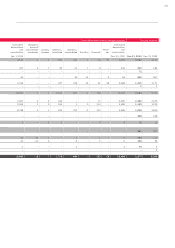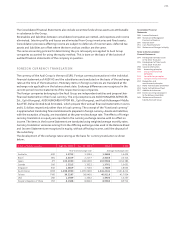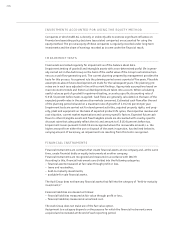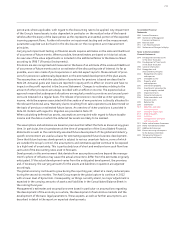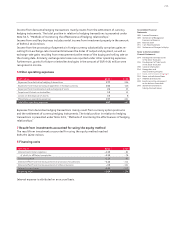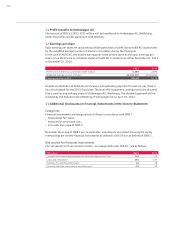Audi 2011 Annual Report Download - page 209
Download and view the complete annual report
Please find page 209 of the 2011 Audi annual report below. You can navigate through the pages in the report by either clicking on the pages listed below, or by using the keyword search tool below to find specific information within the annual report.
206
INVESTMENTS ACCOUNTED FOR USING THE EQUITY METHOD
Companies in which AUDI AG is directly or indirectly able to exercise significant influence on
financial and operating policy decisions (associated companies) are accounted for using the
equity method. The pro rata equity of these companies is regularly recorded under long-term
investments and the share of earnings recorded as income under the financial result.
IMPAIRMENT TESTS
Fixed assets are tested regularly for impairment as of the balance sheet date.
Impairment testing of goodwill and intangible assets with a non-determined useful life is gener-
ally carried out in the Audi Group on the basis of the useful value of the Group’s automotive busi-
ness as a cash flow-generating unit. The current planning prepared by management provides the
basis for this process. As a general rule the planning period covers a period of five years. Plausible
assumptions about future development are made for the subsequent years. The planning pre-
mises are in each case adjusted in line with current findings. Appropriate assumptions based on
macroeconomic trends and historical developments are taken into account. When calculating
useful value as part of goodwill impairment testing, a country-specific discounting rate of
6.0 (5.5) percent before taxes is applied. Cash flows are generally calculated on the basis of the
expected growth rates in the automotive markets concerned. Estimated cash flow after the end
of the planning period is based on a maximum rate of growth of 2.0 (2.0) percent per year.
Impairment tests are carried out for development activities, acquired property rights, and prop-
erty, plant and equipment on the basis of expected product life cycles, the respective revenue and
cost situation, current market expectations and currency-specific factors. Expected future cash
flows to other intangible assets and fixed tangible assets are discounted with country-specific
discount rates that adequately reflect the risk and amount to 6.8 (6.4) percent before tax.
Impairment losses pursuant to IAS 36 are recognized where the recoverable amount, i.e. the
higher amount from either the use or disposal of the asset in question, has declined below its
carrying amount. If necessary, an impairment loss resulting from this test is recognized.
FINANCIAL INSTRUMENTS
Financial instruments are contracts that create financial assets at one company and, at the same
time, create financial debts or equity instruments at another company.
Financial instruments are recognized and measured in accordance with IAS 39.
According to this, financial instruments are divided into the following categories:
– financial assets measured at fair value through profit or loss,
– loans and receivables,
– held-to-maturity investments,
– available-for-sale financial assets.
The Audi Group does not have any financial assets that fall into the category of “held-to-maturity
investments.”
Financial liabilities are classed as follows:
– financial liabilities measured at fair value through profit or loss,
– financial liabilities measured at amortized cost.
The Audi Group does not make use of the fair value option.
Assignment to a category depends on the purpose for which the financial instruments were
acquired and is reviewed at the end of each reporting period.



